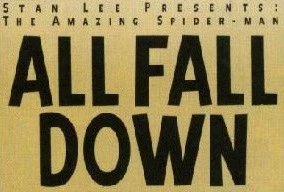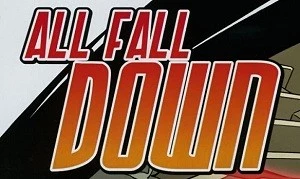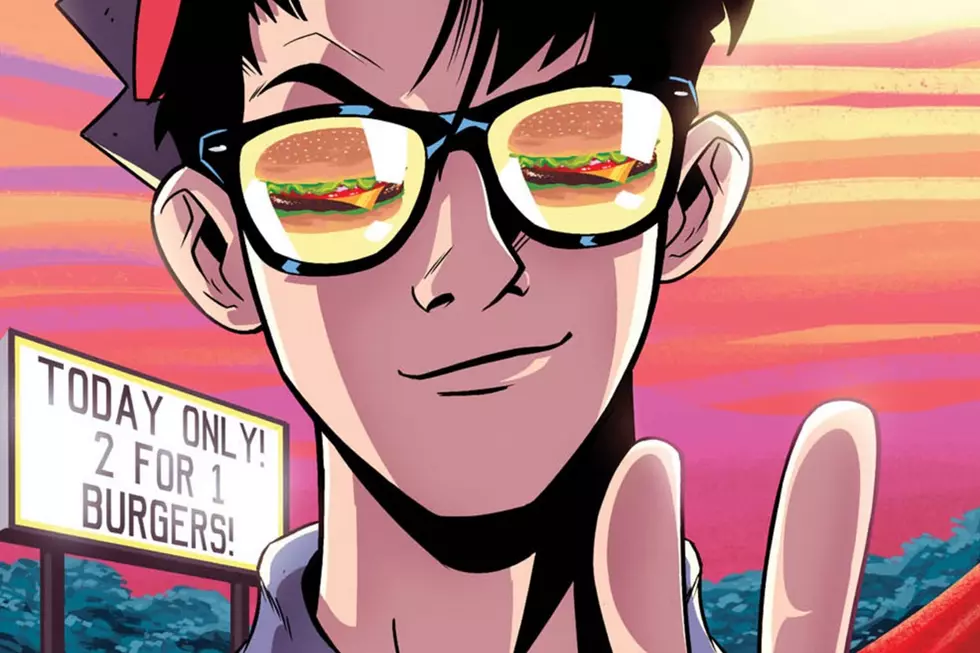
What’s in a Name? The Disappearing Art of Titling a Comic
Probably the last thing most people consider remotely important in a comic is the name of the story in a particular issue, especially in the completely serialized world of modern superhero titles. Just give the six-issue arc a title -- maybe the name of the enemy, that's easy -- and call it a day. Who cares what the damn thing's called? People just want to read a story.
"Batman" #251 (1973) (Written by Denny O'Neil)

The thing is, though, any good story needs a hook, and before stories even had covers, the title was what grabbed readers and drew them in. Names have power, but with the advent of computer lettering and the multi-issue arc, the catchy title seems to be becoming an increasingly lost art in today's superhero comic market. While there are certainly modern examples of imaginative, descriptive, catchy titles -- and I'll go into them below the jump -- there's a whole hell of a lot of stuff going on like this:

"Justice League of America" #249 (1986) (Written by Gerry Conway)

"Captain Atom" #56 (1991) (Written by John Ostrander)

"Robin" #16 (1995) (Written by Chuck Dixon)

"Punisher" #14 (1996) (Written by John Ostrander)

"X-Man" #52 (1999) (Written by Terry Kavanagh)

"Superman: The Man of Steel" #101 (2000) (Written by Mark Schultz)

"Orion" #4 (2000) (Written by Walter Simonson)

"The Amazing Spider-Man" #33 (2001) (Written by J. Michael Straczynski)

"Incredible Hulk" #42 (2002) (Written by Bruce Jones)

"The Amazing Spider-Man" #524 (2005) (Written by J. Michael Straczynski)

"Aquaman" #37 (2006) (Written by John Arcudi)

"Countdown: Arena" #4 (2008) (Written by Keith Champagne)

"Simon Dark" #10 (2008) (Written by Steve Niles)

"Teen Titans" #74 (2009) (Written by Bryan Q. Miller)

If there is absolutely anything the world unquestionably does not need, it is yet another issue of a superhero comic titled "All Fall Down." I didn't even count the variations on "Ashes to Ashes." The above examples were gleamed from Comics.org, and it's notable how the reuse of the title seems to get more and more frequent as we get further into the 2000s -- the examples get more and more DC-oriented, as well, as that's around when Marvel started to eschew naming individual issues in favor of instead naming only the arcs.
There's a certain group of writers -- Brian Michael Bendis, Warren Ellis, Mark Millar -- who either for editorial or creative reasons, completely dropped the practice of naming issues at all, with the tail ends of "New Avengers" and "Ultimate Spider-Man" v1 and the entirety of "Dark Avengers" lacking even explicit arc boundaries, never mind names for them.
On a certain level, that's probably better than quoting the same nursery rhyme over and over, but there's also the fact that the only single issue of "Avengers" I can remember Bendis titling was "Mighty Avengers" #10, "Time Is On No One's Side," which got a title card because it was a retro issue. The implication there, that the single-issue title is an artifact of the past that's been shed by modern comics, is interesting.
This isn't, of course, to propose that Marvel doesn't ever title their comics:

"S.H.I.E.L.D." #2 (2010) (Written by Jonathan Hickman)

But still, the primary format for presenting a title in the modern Marvel comic is the recap page, where it sits apart from the narrative, rather than incorporated into it. The placement of a title card can pack as much punch as its content -- for a cross-media analogue, think of "It's Always Sunny in Philadelphia"; the placement of the title card is usually a direct punchline to the opening sequence, rather than a simple descriptor. As a result, each title sets each episode apart and makes it unique; with comics, titles can do the exact same thing.
Nobody remembers "Batman" #156 or #251, but they do remember "Robin Dies at Dawn" and "The Joker's Five-Way Revenge." It's frustrating at times to be talking about Bendis's "Avengers" and have to refer to "that Immonen-drawn arc with the Hood" or "that thing with the Molecule Man" in lieu of any kind of name. In short: names matter, because names and titles make stories memorable, and memorable stories last longer.
On the other side of the street, DC Comics is definitely better about making sure all of their comics are titled. The problem is that, much of the time, these titles tend to be total afterthoughts, or banal. For every clever title like this...

...you get the cornucopia of comics directly named after or riffing off of W.B. Yeats's "The Second Coming." Reusing song titles or lyrics, movie titles, commercial jingles -- these are all pretty surefire ways to create a generic title that doesn't really describe the story. Use your imagination. Fraction's titles tend to be clever lines of dialogue; Morrison's are usually named after concepts, so that even his use of generic titles ("Domino Effect" for the first issue of "Batman and Robin," for instance) seems story appropriate.
So, in general: Rhink outside of the box a little bit more for the titles. "This Man... This Monster!" didn't quote anybody, and for the most part, neither should you. Give us a double or triple entendre, some word soup, some weird symbols like the name of "Led Zeppelin IV." Give us an anagram or some onomatopoeia or what you ate for breakfast; I don't care. Just give me something to remember, because names only have power as long as they're descriptive, and a name that turns up twenty other results when you run a search on comics.org isn't likely to have very much power at all.
More From ComicsAlliance









